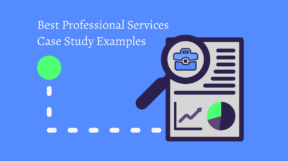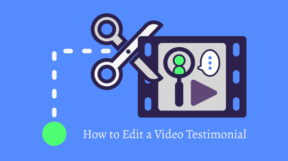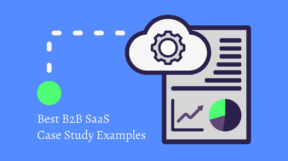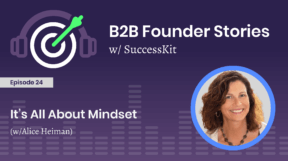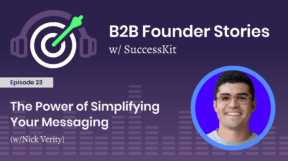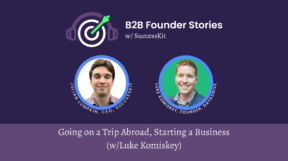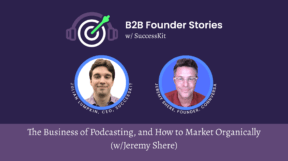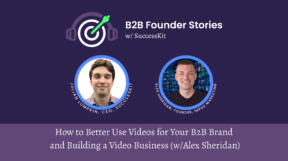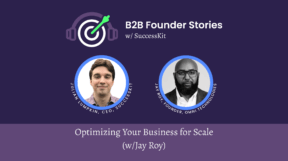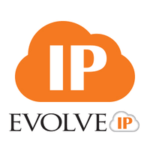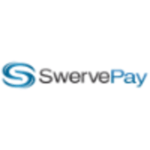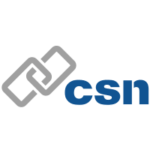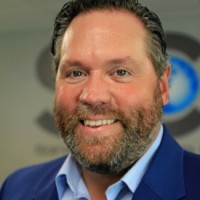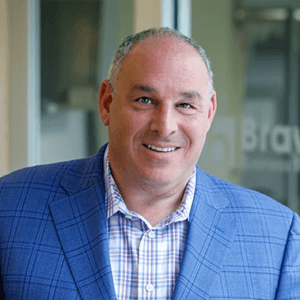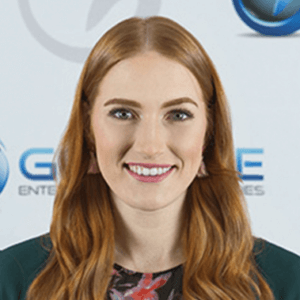Listen to this episode now on Spotify or Apple!
Cliff Jackson, the founder of Gravity Rail Media and SuccessKit’s VP of Marketing, joins Julian on the fourth episode of SuccessKit’s B2B Founder Stories podcast. This episode should capture the interest of any founder of a small to medium-sized business who struggles with marketing services.
During the conversation, Cliff identifies the biggest mistakes he sees founders of small to medium-sized B2B businesses making in marketing and encourages them to get experimental with ads and social media messaging. He also explains how some founders have built a personal brand using LinkedIn and TikTok and describes the small, easy wins that many marketers seem to overlook.
Transcript of Podcast Episode 4: Advertising Your Small Business on TikTok and Other Marketing Tips (w/Cliff Jackson, Founder of Gravity Rail Media)
Julian Lumpkin: Welcome back to the SuccessKit Podcast. In this episode, I interview marketing expert, Cliff Jackson. He’s the founder of Gravity Rail Media. We speak a little bit about his own entrepreneurial experience, but we mostly focus on drawing on his knowledge from advising tons of great companies on their marketing and overall strategy. As you’ll probably hear, Cliff and I are good friends and have worked together for many years in different capacities, including him handling a lot of SuccessKit’s marketing. Here’s my conversation with Cliff. So first of all, Cliff, thanks for joining.
Cliff Jackson: Yeah, thanks for having me, Julian.
Julian Lumpkin: So to kick us off, can you tell us very briefly about your background and what you’re doing now at Gravity Rail Media?
Cliff Jackson: Yeah. So you know this because we met each other back in our first jobs out of college, but my start in the business world was as a sales rep, inside sales rep. And you and I worked at our first job together at IQPC in the events sales life. So I did different sales jobs for about seven years, just to start my career. And I think we have varying opinions on what successful sales are. I think obviously, you’re really good at it. And I was always pretty mediocre at it, really never got a ton of pleasure out of being a salesperson. I just kind of sucked, honestly.
Cliff Jackson: So then I was like, “You know what, I’m going to start a company.” Started a company with my friend, Dante, who’s a graphic designer. You know Dante. And I won’t take you through the whole story, but that was about six and a half years again. And we started just selling websites and simple graphic design services, and it kind of evolved over the years to basically doing performance marketing and trying to help people promote the websites that we were building for them. And I realized pretty quickly that was what I loved to do, and that was what I was good at. And I just doubled down in that, and fast forward to today, and I’m consulting small to medium-sized businesses, anywhere from startups to I have a couple that are billion-dollar corporations, so really, anybody of different sizes, and just helping them to get more clients, get more leads, get more customers, and just optimize their funnels.
Cliff Jackson: I kind of specialize in the dirty work and the backend work of marketing that isn’t really sexy and isn’t what people think about a lot with marketing. But it’s really what makes everything tick and putting the data together, putting the backend stuff together, and just actually getting leads through your funnel and helping the sales team close, that’s what I focus on.
Julian Lumpkin: I think a lot of small to medium-sized entrepreneurs are definitely interested in some of those details, which will be really helpful. Before we get into that, I do have one follow-up question because during the last six or seven years, I know well that you took a break from being on your own and went back into the corporate world, taking a full-time, more traditional job. So the last question on your background is: What made you decide to go … You were doing well in the corporate world. You had worked for yourself. What made you decide to go back to being on your own and running Gravity Rail Media?
Cliff Jackson: Yeah. That’s a good question. I think I had just a lot of questions internally for me about what my future was and where I wanted to end up in 10, 15 years from now. And I think I kind of convinced myself since I started my company, really with the only job history of mine being a sales rep, that was the only professional world experience that I’d had working for a company was as a sales rep. And I realized I think I can make it in a company as a marketing person. I love marketing, so being at a large corporation as a marketer might actually be great for me, and I could really move up. And maybe in 10 to 15 years, I see myself as a CMO, a head of marketing. And I really saw that path for myself potentially, so I just wanted to get in at a big company, have really nice salary, benefits package, and leave behind the stress of owning my own company and worrying about paying for my healthcare. I have a wife and a daughter, so a lot of stress, as you know. You run your company.
Cliff Jackson: It’s just a lot of stress that I was thinking about every day. And so I took a job, and pretty quickly realized that it actually wasn’t great for me. Me personally, I just have trouble working for someone else. I just don’t respond well to authority, and I just want to be in charge, or at least have enough control where I can just leave any client or leave any job. I don’t ever do it. I have great relationships with all my clients. But I think just having that power and having that way out for me is the number one appeal to being an entrepreneur and owning my own business.
Julian Lumpkin: Yeah. It makes sense. I think there’s really different personality types that succeed in a corporate environment versus an entrepreneurial environment. And I know I’ve kind of personally pushed you more towards the entrepreneurial side, always thinking that you were better as a consultant than you would be kind of in a full-time position for one company. So I certainly agree with that decision. You’ve been back. What was it, a couple years ago you left the corporate job? Are you happy with the decision? Are you happy working on your own?
Cliff Jackson: Yeah. So I mean, the other thing is the corporate position I took was in January of … What was it, ’19? Right before COVID, so basically a month and a half into the job was when everything COVID happened. It was fine for the job. The job was fine that I took. There’s nothing wrong with it. But the demand for my niche and really any marketing services I think have gone through the roof, digital marketing services more specifically have gone through the roof since COVID because obviously, everybody’s trying to sell more stuff online, or just have a more digitally online-focused business.
Julian Lumpkin: So that’s a good transition to the next thing I wanted to talk about. So you’re advising, I know you advise some big companies. But really looking at the kind of small to medium-sized growing businesses, especially the ones that are focused, let’s say more on digital marketing now, and building an online presence, what are the biggest mistakes you see founders of small to medium-sized B2B companies making right now in marketing?
Cliff Jackson: Honestly, I see a lot of different mistakes. And companies of all different sizes make very simple mistakes that completely can kind of destroy a campaign before it even starts. I mean, one of the biggest ones that I see is conversion tracking not being set up properly from the start. Someone could be running, spending tens, hundreds of thousands of dollars on ad campaigns, but they don’t have all their conversion actions set up properly, or they’re not through enough. Then there’s no way to attribute back what ads or working, or to really understand how to optimize or improve your ad. And I see that every day.
Cliff Jackson: I got a new client recently that pretty big company with a lot of money and deep pockets, and just didn’t have their conversion tracking set up at all. So it’s like they have hundreds of thousands of dollars in ad spend that I’m looking through to try to understand how to optimize. And really, the data, it’s not useless, but it’s not that useful without being able to connect it back to what actually drove business here. You really can’t know that without just the foundation of strong analytics and conversion actions.
Julian Lumpkin: That’s surprising for a company spending, did you say, hundreds of thousands of dollars on advertising campaigns?
Cliff Jackson: Yeah.
Julian Lumpkin: Not having those things set up.
Cliff Jackson: Yeah. I mean, to say that I was shocked would be probably an overstatement because it’s not that surprising. It’s disappointing though, and I think people just have different priorities. And when they come in, I think there’s just so much that’s overwhelming when you’re trying to set up an online advertising campaign. Just thinking about the creative, and where you have to send people, landing pages, there’s just so many little elements that I think can feel overwhelming to someone who hasn’t had a ton of experience with something like that. So overlooking one piece can be bad and can be really common.
Cliff Jackson: Other really common things that I see that are just a little more nuanced and complicated are conversion optimization items. So they’ll have everything set up, like conversion actions and tracking and everything set up properly, but the landing page just isn’t great and isn’t optimized for conversions. That’s really an art, getting landing pages where they need to be so that you can optimize for conversions. And I just see people failing at that all the time. And they just think, “I put my information and there’s a form. Why isn’t anybody filling out the form?” And as you know, and we’ve worked on this in the past, but there’s just so much more that goes into it than that, placement of the form on the page, the information you have before the form, information you have after the form, what the call to action is, all the copy. Every little element is so key.
Cliff Jackson: And then depending on what you have driving to that landing page, and what information they’re getting from the ad before they go to the landing page, and how those two items work together, that is super important. So there’s just tons of tiny elements that people aren’t thinking about. Anything being off can lead to no conversions, or way less conversions, and if you don’t have that experience, or at least willingness to test with it and play with it that you’re just going to say, “This isn’t working.” Back to that original question you had, people get frustrated and turn ads off, or too intimidated by all of this to even try, so that’s just another thing. All of it is overwhelming.
Julian Lumpkin: Yeah. I think you could’ve been talking about me or SuccessKit on that last point because that is something we struggled with early on, and I know you’ve helped us get better at that. Changing gears a little bit here from mistakes, you interact with a lot of founders of small to medium-sized companies. What are some of the characteristics you see in a founder or a CEO that makes them successful in enabling their marketing department?
Cliff Jackson: I think the biggest thing that I see people do well is to let experts be experts. So I think a founder, especially in earlier stages, gets there because they’re willing to take a lot on and to do a lot. And I’m pretty sure you’ve talked about this on your podcast before, but understanding the point where you need to kind of step back and let someone who has a ton more expertise take over, which usually is me in that case because I’m coming in as a consultant. So the fact that they’re bringing me in is a good first step, but people aren’t always super willing to actually let me have control, or let other people have control.
Cliff Jackson: So I think an indicator of success of any entrepreneur, and I think with marketing specifically, but just everything in general is working on what you’re good at and letting experts, so if you’re bringing a marketing expert in, letting them run things. That isn’t to say that they can’t learn and be a part of it, and ask questions, and just try to build up their own expertise as an entrepreneur in marketing. That’s super important too. But I think to give the experts the power to really be an expert and run things is super important.
Julian Lumpkin: Yeah. Another item that I had a bit of a learning curve early on as well, and it is a common theme, we’ve never discussed it on this podcast as it relates to marketing specifically, more so service delivery. But they’re always kind of giving a little bit of pushback from the kind of founder or CEO perspective. I think there’s always a balance that one has to find, and it can be very challenging, especially when instead of bringing on a VP of marketing when you’re bringing on a consultant who is part-time and working for several different companies, like yourself, it’s very difficult for a founder to give up control. Obviously, you do a great job for all of your clients, and you and I have worked together for a long time, probably a little bit easier for me to give up some of that control.
Julian Lumpkin: But putting myself in a founder perspective, it’s really hard to give up that type of control. And one of the areas where the rubber meets the road, and I experience as the founder, you’re going to know so much detail about a marketing campaign, and think so much about the language that your product or service is described in. And I think kind of to your earlier point though, that feels so important as a founder to say, “Everything must be so precise. Everything in marketing must kind of use the language that we want to use.” And there may be some value to that, but what I found was challenging and ultimately helped was to let go a little bit of that need to control the language because as we saw, it was all about testing different language and different messaging. And as a founder, you kind of on the one hand, justifiably want to control how your product and service is presented, but have to learn to take a little bit of a hands-off approach to get the level of experimentation necessary.
Cliff Jackson: Yeah, I see this all the time too, is people think, especially newer companies, think that every little ad you put out there, or every little social post, or every piece of messaging is going to be recognized and seen by everybody, and everyone’s going to remember it. Actually, nobody gives a shit what you would advertise. No one’s going to remember your headline, your copy. People get so afraid to experiment. And obviously, if you’re working for Pepsi or Coca Cola, you have to be super careful with any ad or any language that you put out there. But if you’re smaller than a nationally recognized brand, which is almost every company, you can test almost any headlines and copy, as long as it’s not offensive, pretty much without recourse. You should be trying everything. But I see it’s so common that people are just agonizing over every little period and capitalized letter and every line. And that’s another huge mistake. People just aren’t willing to test and just try and make mistakes.
Julian Lumpkin: Yeah. As an example of that, I remember way earlier on being frustrated about an ad campaign where we weren’t capitalizing the C and S in Case Study. And I said, “I always capitalized Case Study,” and just kind of understanding that it just doesn’t matter that much. It’s not to say you don’t pay attention to your branding and how you’re positioned, but like you said earlier, getting to the point of recognizing that you can just take so many more risks that we anticipate. I think your example of Coke and Pepsi, or whatever big brand you want to use, is right because when we all kind of … And again, if you’re not an expert marketer, but just a founder finding themselves all of a sudden in charge of marketing, most of your conception of what good marketing is comes from watching advertisements on TV and seeing big brands, and how they have to so carefully position themselves, and make one big commercial that kind of sets their brand.
Julian Lumpkin: Whereas in the kind of small to medium-sized B2B world, it’s nothing like that. Kind of just seeing how hard it is to get people to pay attention or remember you can at least kind of forcing myself to look at how hard it was to get attention, how many people were out there putting out their messages, helped me kind of get over this idea that there was some kind of recorded judgment being cast on your marketing. And if you said something that was inconsistent with what you said six months ago, there were going to be people noticing and caring about it. And just realizing how hard it is to get people to notice and care what you’re doing helps, or at least helped me kind of get out of that mindset and allowed me to kind of experiment with more things than I was initially comfortable doing.
Cliff Jackson: Yeah. If people cared as much as you thought they did, you wouldn’t even need to advertise because—
Julian Lumpkin: They’d already be customers if they were noticing.
Cliff Jackson: Yeah. That would be the best problem to have, honestly.
Julian Lumpkin: Yeah. So let’s shift to a subject that is always I think interesting and I’m certainly no expert on, but I know you’ve pushed me on a little bit, which is personal branding. So you’ve told me, you’ve said this, I’ve heard this spiel many times that the CEO or founder of a small company getting themselves out there is kind of the low-hanging fruit in marketing for a lot of companies. Why is personal branding so important for founders of small to medium-sized companies? And why is it a missed opportunity for a lot of folks?
Cliff Jackson: Yeah. I mean, I will preface all of this by saying that I, like you, I personally don’t have a huge interest in building my personal brand or doing any of that. It is super hard to do, and I think you just have to have an appetite for failure in a lot of ways, and not be afraid of it. And you have to constantly put yourself out there, so I will preface all of it by saying it’s very difficult to do on a personal level, I think. But I think it is low hanging fruit for an entrepreneur or small business owner to even a large business owner, really of any size I think, there’s a huge, huge opportunity in the market for pretty much anybody to grow their business, get new clients, self promote by just building up their social media presence. And there’s a couple reasons I think for it.
Cliff Jackson: First of all, LinkedIn as a platform, there’s an absence of quality content, but there’s the audience for that content. So I think any of us who use LinkedIn, which is probably pretty much everyone listening here, you go on LinkedIn and you’re seeing the same people that you engage with posting pretty much every day. There are not a ton of advertisements. There’s kind of a de-prioritization of company pages on LinkedIn. So the algorithm just very much favors shared content and genuine organic content. That’s just how they’ve built their algorithm. And not a ton of people really have the guts to go out there and regularly do it.
Cliff Jackson: So the people who are building those audiences and putting that time in get a ton of payoff for that work. So I think if you’re an entrepreneur, small business owner, and you have a niche, and you have valuable information to share every day, there’s just so much opportunity to go on LinkedIn and regularly post. And you’re going to get a following. You’re going to kind of build up. And I think it’s really just a matter of having that consistency. And that algorithm right now at this point and time right now, 2022, there’s just an audience to be built there, an opportunity. So that’s the platform itself.
Cliff Jackson: I do think as a culture too right now, our country just … People—Millennials and older, I don’t know about younger—but I think there’s just a big admiration for hustle culture and entrepreneurialism and so anything that you can share, whether it’s in your niche or in that world, I think people are just attracted to that message and people want to hear about it. So the fact that the algorithm favors it, the fact that there’s just an interest there, make it two reasons that you can build an audience.
Cliff Jackson: Another platform that’s really interesting with this is TikTok. Maybe people have or haven’t heard, but it’s becoming more and more a great platform to build a B2B audience on. And there are lots of strategies for doing this, but really the simplest one I think is just kind of similar to LinkedIn, and just going in and making really personal video posts that are just kind of sharing the similar kind of ideas, your expertise. There’s a huge appetite for it on the platform and there’s a lot of people in the 30 years and up age group who are specifically on there watching B2B content. I know everyone … It kind of got its start as a tween platform, but it’s a very legitimate B2B platform. And I keep hearing about more and more people in the marketing space and other B2B spaces that are literally growing million-dollar businesses just from TikTok. So it’s not too late, it’s actually still early to get in there.
Julian Lumpkin: Yeah. And I think if we’ve learned anything from kind of the trends over the last 10 years, it’s that anything that does well in B2C is eventually going to work in B2B too. And people are going to ignore it for a while, but it just becomes inevitable that B2B content makes its way onto seems to be any platform possible. I want to go back, and I don’t think we’re going to get a real answer to this question. Talk for a second about why it’s so difficult to be consistent with this, because I mean, even going back to LinkedIn for what’s probably an easier way for most founders or CEOs to start to build their brand. Easier is to say it’s just easier to write a LinkedIn post than to make a TikTok video for most founders and CEOs.
Julian Lumpkin: But it’s amazing how much we hear the message that you’re stating, and yet how consistently, and I’m 100% guilty of this, of seeing entrepreneur, or CEO after CEO of small companies post three times a week for three to four weeks, get a little traction and then stop. And I’ve done that many times. I see it constantly. A new push of a founder or CEO putting out content, and then a week or two later, it’s gone. And what you’re left with and my impression of the landscape of entrepreneurs on LinkedIn, you’ve got these big names who are 100% legit and they’re running great companies, and they’re making posts that are going viral, and all of their employees are interacting with those posts, and everyone’s seeing. That’s all great.
Julian Lumpkin: On the other hand of the spectrum, you see a lot of posts from what you might call a want-trepreneur, someone who’s kind of BS-ing a little bit and exaggerating what they’re doing, and they don’t necessarily really have a company. But then the in-between space of kind of small to medium legit companies that are trying to grow, they’re just not consistently there. But it is interesting to see how common, and I’m sure you’ve seen it from me and others, the struggles of kind of seeing an opportunity, trying to get out there, but not being able to do it consistently.
Cliff Jackson: Yeah. I think the skill and talent for self-promotion in that way is just a very different skill. It’s one thing to be a really good manager, or a really good leader, and really good at running your business, and good at marketing even. But to be able to put that in words and terms that make sense to someone who’s maybe adjacent to your niche, or understand your niche, or wants to understand more, and package that in a way that it’s understandable for them and useful for them, that’s a really specific talent. And it’s really hard to do. For me, I know the things that I’m thinking about with marketing all day. But I don’t know what would be interesting to somebody’s who’s trying to learn more.
Cliff Jackson: Maybe some of the really nitty-gritty stuff would be interesting. Maybe just more things that I think are obvious are interesting. It’s just hard to have the instinct for that. And then to write about it, and copywriting again, that’s another skill. But you need to be able to write interesting copy. I think for these kinds of posts, balancing information or little tastes of your personality and yourself, while also just getting to the point and making it useful and informational, that’s a real gift. I think the best people doing that, like Dave Gerhardt, do that really well, where you really get a feel for him and his personality. But also, he’s just right to the point. I feel like I know him just from reading his one LinkedIn post a day. That’s just because he’s a good writer. That is his gift. He’s a great copywriter. It’s kind of unfair, but it’s really just made for people who are good at that.
Cliff Jackson: Back to the want-trepreneurs, there’s definitely a lot of people who are just good at writing and have read enough of this crap that they can make it seem like they know what they’re talking about and just get thousands of likes because they’re a good writer. They’re good at positioning and packaging it. And actually, they don’t know anything. Meanwhile, someone who couldn’t be more of an expert about a topic can’t get a single like just because their posts are crap and they’re boring to read. You know?
Julian Lumpkin: Yeah, yeah. That’s the landscape out there. Cool. So moving on from personal branding. My final question for you, and I’ll take personal branding out of this. What is one strategy that all small to medium B2B companies should know about or try that they’re not necessarily doing right now?
Cliff Jackson: I mean, obviously, that’s really case by case. But I think just trying to go for easy wins, top-of-funnel wins. If you’re a company in any industry, or of any size, whether you have brand recognition or not, I assume most cases, if you’re going to be successful, there’s some sort of already existing market of people who have a need for what you’re doing. And so I think a mistake that people often make, and that everyone should be doing, is to just go after the easiest things first. So if you’re a somewhat established brand, just setting up brand search, keyword campaigns, competitor campaigns are another easy one, and just trying to get the easiest leads.
Cliff Jackson: And then something else—we’ve done this with SuccessKit a lot, and I do this with a lot of people—is LinkedIn lead capture. For those who don’t know, you can set up a simple campaign on LinkedIn where there’s a lead form built right into the campaign. And someone will click the ad and they can just fill out the lead form right there. So it makes conversion … It takes a lot of the friction out and makes conversion rates a lot higher. And you can get a lot of quality leads. Obviously, your language needs to be really top of funnel, focused on an immediate need. That’s not for every product and every company, but I think most have …
Cliff Jackson: There’s just some small percentage of people in a very specific niche who are going to have an immediate need. So you should always be running a campaign that’s just trying to go after them. And that should just be a kind of an evergreen, always running kind of campaign that, honestly, I see so few B2B companies running. They’re just not trying to do that. Everyone’s just trying to do something sexier and harder and more complex. And it’s like, “Why don’t you just go for the easiest leads first? And we can build from there.” Once we understand who those clients are and who those prospects are, we can build up kind of earlier indicators of what’s going to be generating or creating a need. How do we catch that earlier? But why not get the people who want to buy now first? Right?
Julian Lumpkin: Yeah. The LinkedIn lead form thing never ceases to amaze me how many small to medium-sized companies don’t know about it. For SuccessKit, this has been one of our long-term, consistent drivers of leads. What always surprises me is how often after getting that lead, talking to that person, they ask me, “Hey, how did you do that thing on LinkedIn where I just immediately filled out the form?” And I talked to them about their strategy, and these are companies that are just beginning marketing. And they’re trying to set up landing pages and really approaching marketing like what they read about Dave Gerhardt’s company doing, or some big shot company that has already captured the low-hanging fruit. And then they have to kind of step back and really educate people from the beginning in a more traditional marketing sense.
Julian Lumpkin: And I see it too where you have small to medium-sized businesses that, yeah, they should do that in the long run, but they’re just missing some really easy campaigns with very simple talk-to-us-now direct messaging because they’ve just been educated on and hear all the stuff from these bigger, well-staffed companies about how you can’t just ask them to buy right away, or you can’t just ask for a meeting in marketing. You have to do all this stuff first, which again, may be true in the long-term, but just missing out on that low-hanging fruit of people who are just ready to respond to your messaging.
Julian Lumpkin: And I think we create Case Studies. In the long run, we may benefit from really educating the market on why Case Studies are important, how to do them, and everything that goes into Case Studies. And we try to do that, and that brings us some long-term success. But it would be a huge mistake for us not to just put out extremely simple ads saying, “Do you need Case Studies now?” I think a lot of small to medium-sized business owners don’t realize that some of that simple stuff just works if it’s done right.
Cliff Jackson: Yeah. It always works. Maybe you’re paying more for that lead, but your cycle’s going to be shorter. Your qualifying rate should be higher, especially with LinkedIn. And you can really target the exact job title you want, the exact industry you want, and really just try to get the premium lead. You should want to pay a lot more for that lead because that’s your best possible lead you can get. And I think you touched on too in that, another huge benefit of using the lead gen forms built in, you cut out so much of the additional challenges and elements that really hang up people, especially without marketing experience.
Cliff Jackson: You don’t have to worry about a landing page and all its copy. You don’t have to worry about setting up conversion tracking on the landing page. It’s all just built right in. You can actually do these campaigns with Facebook, Instagram as well, and I do them a ton on both platforms. I feel like a lot of marketers have kind of scoffed at these campaigns. And I’ve never understood it because it’s just the best possible thing. And I push it in every scenario I possibly can because I’m good at building landing pages. And I still, if I can avoid using one, I’m going to because you’re taking a step out. And every time you can take a step out in any marketing, you should do it because you’re that much closer to conversion.
Cliff Jackson: And to touch on another thing that I think people don’t do a lot is remarketing campaigns. Just a really simple thing that obviously, if you’re setting up any sort of semi-sophisticated ad campaign, you’re going to have remarketing built into it. But I think a lot of people who aren’t quite yet ready for marketing, or they’re just getting started, I think they put it off a lot. And I see that just not happening until later. Or I’m coming into an account and it’s like, “Oh, you never set up your marketing. Why not?” And a lot of times because they just didn’t know how to set up the pixel or whatever, just some simple barrier like that. It’s a really easy thing to do, and it’s also platforms make it really cheap for you to promote your own, again, it’s an audience that you are already engaged with and already engaged with your site.
Cliff Jackson: So a Google display remarketing ads are super cheap to run. And you know this from the ads we run for SuccessKit, Julian, but those things follow you everywhere. And why would you not want a prospect? You could set up your pixels so it’s only people who go to the pricing page. And you can have a campaign just trying to get them to book a meeting. You can make it that simple just off the bat, even if you’re just driving them back to your contact page. You don’t have to set up a landing. Just the more plays you can get them back into your site, that’s just all you’re trying to do is just keeping your brand front of mind for them at that point.
Julian Lumpkin: Awesome. I think there’s been a lot of really helpful tips for founders and CEOs, or perhaps even marketers. But I think we’ve done a really good job giving some really actionable advice to a founder or CEO of a small to medium-sized company maybe just starting into marketing. As we wrap up, Cliff, if anyone here wants to find you, where is the best place for them to find you if they need some help with their marketing?
Cliff Jackson: Yeah. You can go to my website at gravityrailmedia.com. Or you could look me up on LinkedIn. My name’s Cliff Jackson, which makes it hard to find me anywhere on the internet because it turns out it’s a pretty common name. There’s a famous jazz saxophonist named Cliff Jackson, and that’s who comes up first usually. So that’s not me, but go to Gravity Rail Media and you can find me there.
Julian Lumpkin: All right, Cliff. This has been great. Thanks again for your time.
Cliff Jackson: Yeah. Thanks, Julian.
Julian Lumpkin: Thanks for listening to my conversation with Cliff on the SuccessKit Podcast. If you need help with your case studies, visit us at successkit.io to learn more about how we can help.
Conclusion
Subscribe to the B2B Founder Stories podcast on Spotify and Apple and never miss an episode!
If you have an idea for a future topic you’d like addressed or if you’d like to be a guest on the series, contact Julian via the form on our Learn More page.
![Featured image for the blog post titled Advertising Your Small Business on TikTok and Other Marketing Tips (w/Cliff Jackson) [PODCAST]](https://successkit.io/wp-content/uploads/2022/01/successkit-podcast-episode-4-cliff-jackson.png)



